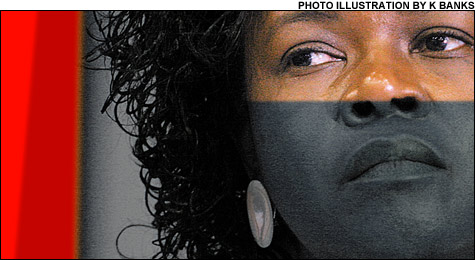
UNANSWERED QUESTIONS: As she pushes ahead with a State Senate sticker campaign, Dianne Wilkerson is once again dogged by accusations of dubious ethics. |
Undeterred by her Democratic primary loss to opponent Sonia Chang-Díaz, State Senator Dianne Wilkerson is forging ahead in a sticker campaign to win re-election of her Second Suffolk seat in the state legislature. But as the eight-term state senator’s catalogue of heretofore published misdeeds — campaign-finance violations, failure to pay taxes, and a police accusation of perjury — likely weighed her down in that primary, the Phoenix has uncovered two new disturbing political irregularities that might hurt her in the general election. One involves a questionable personal loan from a powerful developer who has dealings with the State Senate, and the other involves, yet again, failure to file tax returns, this time for a nonprofit she has run.
Two years ago, facing foreclosure and a lawsuit over unpaid condo-association fees, Wilkerson was rescued by a developer who, with his brother, presides over a veritable affordable-housing empire — they’ve shelled out tens of thousands of dollars on Beacon Hill to push an agenda that has pitted them against low-income tenants and their supporters, ironically the very demographic that is supposed to be the heart of Wilkerson’s base.
The other eyebrow-raising situation concerns Wilkerson’s stewardship of a black-leadership conference that, while attracting big-name corporate sponsors, appears to have failed to see to the filing of mandatory tax returns for that organization.
Wilkerson did not respond to several requests for an interview, nor to a list of questions e-mailed to her press secretary.
Friends in high places
While there is little doubt that Wilkerson enjoys widespread grassroots support among black voters, less recognized — at least until now — is the crucial support that has often come from white friends in high places.
In November of 2006, Wilkerson received a $66,900 mortgage from the Commonwealth Capital Corporation. The mortgage does not specify an interest rate, has a bizarre 18-month term, and is the only personal loan by Commonwealth Capital found on file at the Suffolk Registry of Deeds in a database that goes back as far as 1979. Eight months later, Wilkerson sold her condo, which she bought for $81,370 in 1993, for $460,000.
First, a little history about the mortgage writer and his brother. Commonwealth Capital is owned by Robert Kargman, who is also the owner of Douglass Park, the building near Northeastern University where Wilkerson’s condo was located. To say Kargman and his brother, William, are affordable-housing owners and developers is a bit like saying the Red Sox are a baseball team. They manage a sprawling portfolio of buildings housing thousands of units — much of it inherited from their father, Max — including Tremont on the Common, the downtown condo tower overlooking the park that also houses their offices. (Requests for comment from either Robert or William Kargman were unsuccessful; ultimately, assistants said they were out of town and would be unavailable for comment.)
The brothers tend to keep a low media profile, though that has been difficult to maintain in recent years, as the Kargmans have sought to give up or get out of federal low-income housing contracts in order to refashion their buildings into upscale apartments and condos. While there is nothing that legally prevents them from doing so, given the shortage of affordable housing in the state, this has angered tenants and affordable-housing advocates.
The Kargmans “made windfall profits with little cash investment in the 1960s, and still more when they refinanced in the early ‘90s,” says Michael Kane, executive director of the Massachusetts Alliance of HUD Tenants, “and now they stand to make even more by going to market, all paid for by taxpayers and tenants.” Kane estimates the brothers own nearly a dozen large developments around the state that were financed with 40-year mortgages from the US Department of Housing and Urban Development that have reached or are nearing the end of their terms.
Given the nature of their business, members of the Kargman family have long sought to have their say in Washington and on Beacon Hill. Max, the patriarch, served as president of the National Advisory Council of HUD Management Agents. William, his son, was chairman of a national HUD managers lobby group in the early 1990s, and then head of the rental-housing division of the Greater Boston Real Estate Board, an influential Beacon Hill lobby. The Kargman brothers have also contributed to political candidates, with Robert donating nearly $39,000 and William nearly $11,000 since the start of 2007 to candidates in national races. Records in the Office of Campaign and Political Finance show that, along with members of their families, they have also over the past several years contributed to candidates at the state level, including Wilkerson — sums that collectively figure in the tens of thousands.